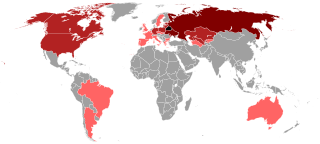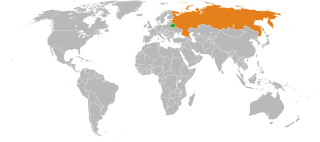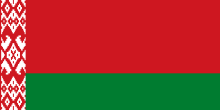
Belarus, officially the Republic of Belarus, is a landlocked country in Eastern Europe. It is bordered by Russia to the east and northeast, Ukraine to the south, Poland to the west, and Lithuania and Latvia to the northwest. Covering an area of 207,600 square kilometres (80,200 sq mi) and with a population of 9.2 million, Belarus is the 13th-largest and the 20th-most populous country in Europe. The country has a hemiboreal climate and is administratively divided into six regions. Minsk is the capital and largest city; it is administered separately as a city with special status.

The Byelorussian SSR was one of only two Soviet republics to be separate members of the United Nations. Both republics and the Soviet Union joined the UN when the organization was founded in 1945.

Belarusians are an East Slavic ethnic group native to Belarus. More than 9 million people proclaim Belarusian ethnicity worldwide. Nearly 7.99 million Belarusians reside in Belarus, with the United States and Russia being home to more than half a million Belarusians each.
The lands of Belarus during the Middle Ages became part of Kievan Rus' and were split between different principalities, including Polotsk, Turov, Vitebsk, and others. Following the Mongol invasions of the 13th century, these lands were absorbed by the Grand Duchy of Lithuania, which later was merged into the Polish–Lithuanian Commonwealth in the 16th century.

Belarusian is an East Slavic language. It is one of the two official languages in Belarus, alongside Russian. Additionally, it is spoken in some parts of Russia, Lithuania, Latvia, Poland, and Ukraine by Belarusian minorities in those countries.

Minsk is the capital and the largest city of Belarus, located on the Svislach and the now subterranean Niamiha rivers. As the capital, Minsk has a special administrative status in Belarus and is the administrative centre of Minsk Region and Minsk District. As of 2024, it has a population of about two million, making Minsk the 11th-most populous city in Europe. Minsk is one of the administrative capitals of the Commonwealth of Independent States (CIS) and the Eurasian Economic Union (EAEU).

Alexander Grigoryevich Lukashenko is a Belarusian politician who has been the president of Belarus since the office's establishment in 1994. This makes him the longest-serving European president.

The Byelorussian Soviet Socialist Republic, also known as Byelorussia, Belarusian SSR, Soviet Belarus, or simply Belarus, was a republic of the Soviet Union (USSR). It existed between 1920 and 1991 as one of fifteen constituent republics of the USSR, with its own legislation from 1990 to 1991. The republic was ruled by the Communist Party of Byelorussia and was also referred to as Soviet Byelorussia or Soviet Belarus by a number of historians. Other names for Byelorussia included White Russia or White Russian Soviet Socialist Republic and Belorussian Soviet Socialist Republic.

The state flag of Belarus is a red-green bicolour with a red-on-white ornament pattern placed at the hoist (staff) end. The current design was introduced in 2012 by the State Committee for Standardisation of the Republic of Belarus, and is adapted from a design approved in a May 1995 referendum. It is a modification of the 1951 flag used while the country was a republic of the Soviet Union. Changes made to the Soviet-era flag were the removal of communist symbols – the hammer and sickle and the red star – as well as the reversal of the colours in the ornament pattern. Since the 1995 referendum, several flags used by Belarusian government officials and agencies have been modelled on this national flag.

At the top level of administration, Belarus is divided into six regions and one capital city. The six regions are oblasts, while the city of Minsk has a special status as the capital of Belarus. Minsk also serves as the administrative center of Minsk Region.

The Union State, or Union State of Russia and Belarus, is a supranational union consisting of Belarus and Russia, with the stated aim of deepening the relationship between the two states through integration in economic and defence policy. Originally, the Union State aimed to create a confederation; however, both countries currently retain their independence.

The Belarus national football team represents Belarus in men's international football, and is controlled by the Football Federation of Belarus, the governing body for football in Belarus. Belarus' home ground is Dinamo Stadium in Minsk. Since independence in 1991, Belarus has not yet qualified for a FIFA World Cup or UEFA European Championship.

The Football Federation of Belarus, also known as Belarusian Football Federation, is the governing body of football, beach soccer and futsal in Belarus. It organizes the Belarusian Premier League, Belarusian national football team and the Belarus women's national football team. It is based in Minsk.

The president of the Republic of Belarus is the head of state and head of government of Belarus. The office was created in 1994 with the passing of the Constitution of Belarus by the Supreme Council. This replaced the office of Chairman of the Supreme Council as the head of state. The tasks of the president include executing foreign and domestic policy, defending the rights and general welfare of citizens and residents, and upholding the Constitution. The president is mandated by the Constitution to serve as a leader in the social affairs of the country and to act as its main representative abroad. The duties, responsibilities and other transitional clauses dealing with the presidency are listed in Chapter Three, Articles 79 through 89, of the Constitution.

The National State TV and Radio Company of the Republic of Belarus, known as Belteleradiocompany or simply Belteleradio, is the state television and radio broadcasting service in Belarus.

The X Factor is a television music competition franchise created by British producer Simon Cowell and his company Syco Entertainment. It originated in the United Kingdom, where it was devised as a replacement for Pop Idol (2001–2003), and has been adapted in various countries. The "X Factor" of the title refers to the undefinable "something" that makes for star quality.

Belarus and Russia share a land border and constitute the supranational Union State. Several treaties have been concluded between the two nations bilaterally. Russia is Belarus' largest and most important economic and political partner. Both are members of various international organizations, including the Commonwealth of Independent States, the Eurasian Economic Union, the Collective Security Treaty Organization, and the United Nations.

Belarus and Ukraine are both are full members of the Baku Initiative and Central European Initiative. In 2020, during the Belarusian protests against president Lukashenko, the relationship between Ukraine and Belarus began to deteriorate, after the Ukrainian government criticized Belarusian president Alexander Lukashenko. In the waning days of 2021, the relationship between both countries rapidly deteriorated, culminating in a full-scale invasion on 24 February 2022. Belarus has allowed the stationing of Russian troops and equipment in its territory and its use as a springboard for offensives into northern Ukraine but has denied the presence of Belarusian troops in Ukraine. Even though part of the Russian invasion was launched from Belarus, Ukraine did not break off diplomatic relations with Belarus, but remain frozen.

The 2020–2021 Belarusian protests were a series of mass political demonstrations and protests against the Belarusian government and President Alexander Lukashenko. The largest anti-government protests in the history of Belarus, the demonstrations began in the lead-up to and during the 2020 presidential election, in which Lukashenko sought his sixth term in office. In response to the demonstrations, a number of relatively small pro-government rallies were held.

Belarus, a close ally of Russia, has supported its eastern neighbour in the Russian invasion of Ukraine. Before the start of the offensive, Belarus allowed the Russian Armed Forces to perform weeks-long military drills on its territory; however, the Russian troops did not exit the country after they were supposed to finish. Belarus allowed Russia to stage part of the invasion from its territory, giving Russia the shortest possible land route to Ukraine's capital, Kyiv. However, these forces withdrew within two months, thus ceasing land-based military operations originating from Belarus and resulting in the recapture of the Ukrainian side of the border region by Ukraine. Despite this, the situation along the border remains tense, with Ukraine closing the border checkpoints leading into Belarus, bar special cases.

















